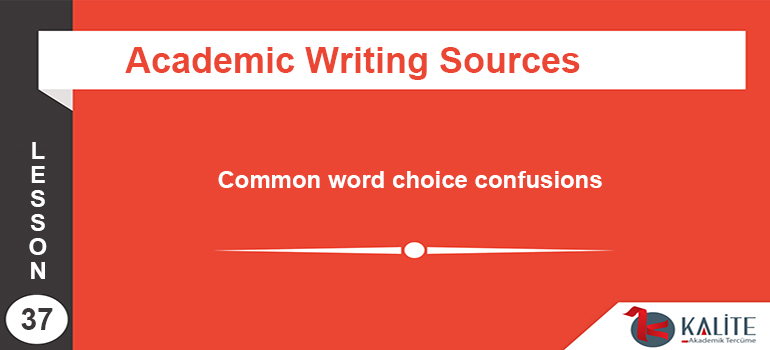
Common word choice confusions
There are words that you should (mostly) avoid, but a handful of other words are simply misused or misunderstood. These prove useful in many situations and are used by nearly everyone, but their occasional misuse or abuse can sew confusion in your writing and turn your reader away.
This article lists some of the most frequently misused words, focusing both on issues specific to ESL writers and on issues for all writers of English.
Research (the noun)
“Research” is a tricky word because it is both a noun (e.g. “I conduct research”) and verb (e.g. “I research crustaceans”), but especially because the third person form of the verb (e.g. “He researches invertebrates”) looks like a plural form of the noun () the problem is that there is no plural form of the noun “research,” meaning that “researches” can only be used as a verb.
The noun “research” belongs to the class of nouns called “non-count nouns,” nouns (including others like sugar, oil, homework, and peace) that we don’t normally (if ever) count, so they don’t (normally) come with “–s” or “–es” plurals. Some of these “non-count” nouns, called “mass nouns,” can take plural forms even though we don’t count them (e.g. “essential oils”), but “research” is not one of these.
|
Examples: Non plural words |
|
All of these researches are included in the literature review. |
|
All of these studies are included in the literature review. |
|
All of this research is included in the literature review. |
However, vs. however
“However” has two different meanings: first, we have “however” as in “but,” expressing contrast; second, we have “however” as in “regardless of how,” “to whatever degree,” or “in whatever manner,” expressing not contrast but disregard.
We can tell the two versions of this word apart because the first is always followed by a comma while the second is never followed by a comma. In grammatical terms, we call the first a “conjunctive adverb” (or “transitional adverb”) and the second a “plain old adverb.”
|
Examples: Different meaning of “however” |
|
She liked popcorn with butter, however too much salt would spoil it. |
|
She liked popcorn with butter; however, too much salt would spoil it. |
|
He would get to the chapel for his wedding; however, he had to get there. |
|
He would get to the chapel for his wedding however he had to get there. |
This and these vs that and those
All of these words have more than one role to play, but here we’re interested in uses of these words to point to things recently mentioned in a text (e.g. “All parties in the coalition abide by the law. These countries are aware of the consequences”).
The difference between “this” and “these,” on the one hand, and “that and those,” on the other, is what they suggest about proximity. “This” suggests closeness, while “that” suggests more distance. For this reason, when choosing one of these words to refer to something just mentioned, prefer to use “this” or “these” instead of “that” or “those.”
The exception to this preference is when you have a point you want to make emphatically, in which case “that” or “those” is a better choice (e.g. “To surrender to a malicious force—that was the only choice”).
Who vs. that
The word “that” has many more occasions for use than “who,” which perhaps explains why “that” is sometimes used where “who” is appropriate. The basic difference in usage is this: “who” is used when it refers to a person
|
Examples: Correct using of “who” |
|
She was the one that insisted on using serial commas in academic writing. |
|
She was the one who insisted on using serial commas in academic writing. |
Who vs. whom
The simplest rule to remember here is that “who” is used in cases where “he” or “she” would be appropriate, while “whom” is used in cases where “him” or “her” would be appropriate.
Another helpful tip is that only “whom” appears after a “preposition” (e.g. of, in, by, around, upon, etc.). The grammatical difference here is called “case,” where “who” (like “he” and “she”) is in the “subjective case,” and “whom” (like “him” and “her”) is in the “objective case.”
If you have a handle on grammatical “subjects” and “objects,” you might notice that “who” appears only as a subject (the thing doing the action) and “whom” appears only as an object (the thing being acted on).
|
Examples: Correct using of “who” and “whom” |
|
The man who left his car unlocked got robbed. (consider: “He left his car unlocked.”) |
|
The man, who she robbed, is now destitute. (consider: “She robbed he.”) |
|
The man, whom she robbed, is now destitute. (consider: “She robbed him” = “whom she robbed”) |
|
The man in who she trusted left her no choice but to steal. (consider: “She trusted he.”) |
|
The man in whom she trusted left her no choice but to steal. (consider: “In him she trusted.”) |


